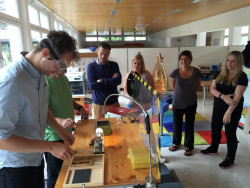The networks of social enterprises: a resource for marginalized rural regions in Europe
In recent years, policy makers and researchers direct high expectations on social enterprises. They regard social entrepreneurs as actors who combine the innovative power of entrepreneurs with the mission to fight social challenges. Social enterprises are seen as players who operate in areas where the state and market players withdraw. This makes them promising actors in marginalized rural regions. However, little is known about how social enterprises operate in rural regions, how they generate and facilitate innovative solutions and contribute to rural development. The symposium "Intermediaries in the Countryside", held on December 7 and 8, 2017 at Adam Mickiewicz University Poznan (Poland), addresses these gaps. It is organised by the RURINNO project, which involves academics from two research institutes and practitioners from four rural social enterprises across Europe. The strong collaboration enables researchers to conduct in-depth field research. Additionally, RURINNO involves a training and a communication part. Staff members of the social enterprises spend several weeks in the research institutes in order to draw conclusions on the empirical findings, to enhance their innovative capacity, to develop strategies for empowering people in rural communities and to improve the communication about products and services. The combined research and training programme receives funding from the H2020 MSCA RISE scheme and benefits considerably from its cross-sectoral approach. The research shows that social enterprises effectively address social challenges. They interconnect remote regions with supra-regional networks and institutions on other spatial scales. In doing so they mobilize new ideas, extended resources and support for rural communities that would otherwise be hardly available. One project partner for example, the Austrian social enterprise Otelo, establishes open technology labs in villages and small towns. The labs provide open spaces and technical equipment for experimenting, skills training and inspiring people. The idea of open labs originates in bigger cities. Otelo became aware of it and adjusted it according to the needs of rural communities. As in the case of Otelo, social innovation in rural regions is often based on the re-contextualization and adaptation of ideas and knowledge. Finding innovative solutions for social challenges is hardly an endogenous process but takes into account knowledge and solutions proven in other contexts or places. For the identification of ideas and opportunities, social enterprises benefit from their far-reaching network contacts. Access to different social networks is an important resource of rural social enterprises. For this reason, the RURINNO researchers conducted egocentric social network analyses. The analyses reveal that rural social entrepreneurs have specific assets that can compensate limited access to knowledge, resources and power, which characterises many rural communities. For example, the Polish social enterprise NIDA maintains close relations with policy makers, lobby groups and support organisations on the national and international level. Compared with the hierarchical and geographically limited relations of local policy makers the network contacts of NIDA enable them to identify new trends and opportunities much faster. Of course, rural social enterprises would hardly foster social innovation if they were only involved in supra-regional networks. Supporting social innovation and empowering people also requires trustful relations with local stakeholders. The RURINNO network analyses reveal a high degree of embeddedness in rural communities. Rural social enterprises interconnect local and supra-regional actors. They are embedded intermediaries. More information on the project and the symposium can be found at rural-innovations.net.
Countries
Austria, Germany, Greece, Ireland, Poland



